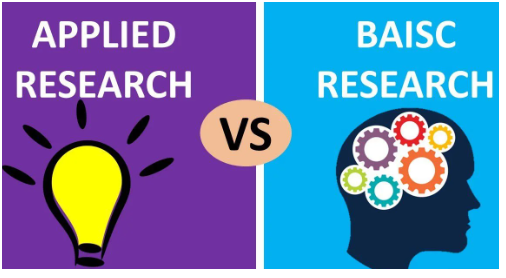Study the main differences between basic vs applied research

Question: Explain basic research and its practical implications. Explain applied research. Compare basic vs applied research. State the similarities between basic vs applied research.
Do you know about basic and applied research? How are they applied? Is there any difference between basic vs applied research? Almost every student has such questions when asked to write a research paper or an academic paper at an advanced level of education.Research is a study where an individual tries to find answers to particular issues.However, the premise of the difference between basic vs applied research lies in how they are directed or conducted.
To find the answer to a research problem, a study is conducted taking into account a specific target group.Research can be divided into two segments depending on the requirement: basic research, and applied research. However, before we go into the details of basic vs applied research, it is essential to understand the meaning of both and then comprehend their difference.
Explaining basic research
Simply speaking, basic research is a type of examination that is conducted to advance humanunderstanding. The main goals of basic research are increasing information, understanding the phenomena of interest, and building ideas about the research findings. The other names for this type of research are pure, fundamental, unadulterated, or central research.Basic research is entirely theoretical that concentrates on basic principles and testing theories. It tries to study the basic law.
Basic research is applicable to the generalization and explanation of theory based on human behavior. It is regulated towards gathering information that has global applicability.Hence, basic research assists in building new knowledge to preexisting knowledge. A few basic research examples are listed below in this blog on basic vs applied research.
- Determining the influence of stress levels on students when they tend to resort to academic cheating
- Understanding caffeine consumption and its effect on the brain
- Determining the probability of being diagnosed with depression in men and women
- Differentiating the attachment style among children of divorced parents from that married parents
- A study on the evolution of cryptocurrency
If you go through the topics, you will understand that these are not new topics; instead, they are merely adding to the previous knowledge on a topic. They are not about giving a solution to a problem.
Advantages of basic research
Basic research is so-called as it does not generate any new benefit, yet it may lead to crucial solutions in the future.It helps develop underlying knowledge that can be used to gain additional knowledge. There are several advantages of basic research, which are listed below in this blog on basic vs applied research:
- Getting an understanding of the environment and the systems living in it
- Collecting information for society’s help and preparing it for future
- Improving knowledge leading to medical progress
- Giving a base for applied research
Practical implications of basic research
During the invention of phones, intellectual researchers began questioning their utilization and thought it could increase car accidents. The concern was not based on the fact that drivers will use one hand to drive and the other to hold the phone but given the text messages or chats they would be doing.These opinions were on basic speculations and limited considerations.
But gradually, the classical condition standards increased from examining non-human subjects.Since disclosing these standards, they have been tried for several human issues, for instance, demonstrating clear information, treating obese people, treating mentally unbalanced teenagers, treating fears, etc.
Explaining applied research
Applied research is research that deals with real-world employment of natural science.It is intended to give a solution to a particular real problem and builds innovative technology. The problems or issues can concern individuals, groups, or society. It is also known as a scientific process because it uses scientific tools to find answers to problems.
In simpler terms, research can be employed in realsituations. It scrutinizes specific circumstances to connect the results to their corresponding circumstances.It comprises research that concentrates on specific conclusions encountering a business problem.Research related to social, political, or economic trends uses the applied research technique to conduct research.
A few applied research examples are listed below in this blog on basic vs applied research.
- Research on how to reduce illiteracy in teenagers
- A study attempting to reduce fraud occurring on social media platforms
- A study investigating ways to treat patients with insomnia
- A study to discover marketing strategies applicable on a college campus
- A study to discover how to make car tires long-lasting
Advantages of conducting an applied research
Though applied research broadens on the base of existing knowledge, it is a method to give rise to new ideas. The research gives several advantages in different settings mentioned in this blog on basic vs applied research:
- Designing new products and services
- Giving unbiased data with the aid of verifiable evidence
- Building new objectives
Comparison chart
Grounds for comparison Basic research Applied research
Definition Basic research is a study that is aimed at widening the existing foundation of scientific knowledge. Applied Research is designed to find solutions to specific real problems or answer certain questions.
Nature Theoretical Practical
Usage Universal Limited
Related with Developing scientific knowledge and predictions Development of technology and technique
Aim To include some knowledge to the existing one. To discover a solution for the present problem.
Major differences between basic vs applied research
The points discussed below in this blog on basic vs applied research explain the major differences between both types of research.
Nature: Basic research is somewhat hypothetical as it generates speculation and explores information that may not be applied correctly. It basically revolves around enhancing existing knowledge. In contrast, applied research is utilized for scientific studies useful for solving real-world problems.
Degree: The basic research can be applied in different scenarios, whereas applied research has limited applicability. Basic research is universally applicable compared to applied research, which is applied to a particular problem for which it was used.
Innovation: The key idea behind basic research is to develop predictions and scientific knowledge. In contrast, applied research emphasizes improvement in technology or innovation with the aid of basic science.
Future: The goal of basic research is to include some information about a preexisting one, whereas applied research aims to discover a solution to a problem under consideration.
Business objective: Basic research assists society in studying more about a specific area of study, whereas applied research tries to provide commercial gain. Applied research has a probability of leading to financial gains by assisting in the creation of new products.
Usage: Basic research is universal and can be applied in fields like sociology, astronomy, theology, biology, and philosophy, whereas governments and industries use applied research.
Methods: Applied research is focused and utilizes various methods to gather and evaluate data to gain practical solutions. In contrast, basic research is exploratory and unstructured, often including verifying new hypotheses and investigating new concepts and ideas.
Timeframe: Basic research has a longer timeframe and may not be applicable for research which requires instant solutions, whereas applied research has a limited timeframe as it is required to generate immediate solutions for real problems.
Funding: Basic research is funded by educational organizations and government bodies that try to increase human knowledge, whereas applied research is funded by organizations, industries, and government that wants to develop new products, technologies, or services.
Setting: Basic research takes place in a highly-controlled setting like a laboratory, whereas applied research occurs in a real-world setting where unknown variables may step in.
Similarities between basic vs applied research
Though there are clear differences between basic vs applied research, there are many similarities between these two researchmethods.For instance, methods to gather data (such as surveys, interviews, and focus groups) can be applied in both types of research.
In both types of research, researchers need to utilize inductive and deductive reasoning to build and establish hypotheses. Applied and basic research often coincides when basic research acts as a beginning for applied research.
If the applied research is result-based, it is vital to conduct basic research to gather information and develop remedies for many problems.
Significance of understanding the difference between basic vs applied research
Understanding the difference between basic vs applied research is crucial when planning to conduct research. It assists researchers in recognizing the accurate approach and strategy for attaining their objectives and conveying their findings to the readers.
For instance, if you are conducting applied research, you may need to concentrate on practical outcomes and utilizing approaches suitable for testing and examining products and services. They may also require conveying their findings in a relevant and understandable method to all the stakeholders.
Researchers carrying out basic research may require concentrating on producing fresh ideas and theories and conveying their findings to other researchers in the same field.
Apart from the above reason, it is vital to ensure that resources and research funding are also given appropriately, which can only be judged when you understand the difference between the two research methods.
Methods applied in basic research and applied research
Although both these researches have varied approaches and goals, they need data to be gathered by the scientists or the researchers. Basic and applied research employs several identical methods for data collection, and a few of them are discussed in this blog section on basic vs applied research.
Observation:Learning the subjects for the research work for a longer time permits the researchers to collect information about the subject’s behavior under varied circumstances.
Interviews: One-to-one discussions and surveys assist researchers in getting information from other subjects and certifying the data.
Experiments: Experiments are carried out by researchers to establish or demolish certain hypotheses relying on information that has been collected.
Questionnaires:A set of questions connected with the research context aids the researcher in collecting quantitative information pertinent to applied and basic research.
Determining the application of basic vs applied research
Both research methods are useful in producing relevant knowledge. Yet, they are not always applied in identical or similar contexts or under the same settings.
If you are trying to decide the type of research applicable to your study, it is vital to think about the product goals.To address a universal or theoretical question through your study, you must use basic research. However, the research can bring out a particular knowledge, but it is not applicable to develop a solution for a problem. In contrast, applied research finds answers to clear questions. It must be applied to discover a solution to a problem or new information.
Wrapping up
The application of research may differ on the grounds of the level at which it is being carried out and the reason behind conducting it.You can select basic research over applied research when trying to add scientific knowledge, but when trying to discover a solution to a real problem, applying applied research is an ideal way out. Both basic and applied research approaches are applicable to collect information and examine facts that help develop knowledge about a specific subject.Through this blog on basic vs applied research, we have understood that basic research is utilized to clarify and satisfy curiosity. Still, applied research is utilized to solve particular problems.
FAQs
Is applied research quantitative or subjective?
Applied research has a quantitative nature. Quantitative research focuses on the number of respondents considered for the study.
What is the use of conducting basic research?
Basic research is conducted to gather knowledge about a specific field of study explored by the researcher.
List the five types of research strategies.
1. Review strategy
2. Interview strategy
3. Perception strategy
4. Exploratory technique
5. Center group technique
Total Assignment Help
Incase, you are looking for an opportunity to work from home and earn big money. TotalAssignmenthelp Affiliate program is the best choice for you.
Do visit :https://www.totalassignment.com/affiliate-program for more details
Total Assignment help is an assignment help Online service available in 9 countries. Our local operations span across Australia, US, UK, South east Asia and the Middle East. With extensive experience in academic writing, Total assignment help has a strong track record delivering quality writing at a nominal price that meet the unique needs of students in our local markets.
We have specialized network of highly trained writers, who can provide best possible assignment help solution for all your needs. Next time you are looking for assignment help, make sure to give us a try.
Looking for Assignment Help from Top Experts ?
Get the best Assignment Help from leading experts from the field of academics with assured onetime, 100% plagiarism free and top Quality delivery.


